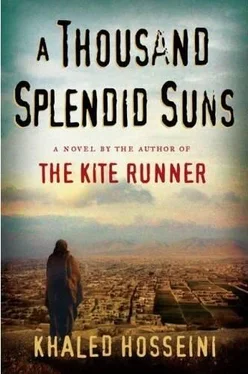Laila murmured encouragingly. It would be an existence rife with difficulties, she saw, but of a pleasurable kind, difficulties they could take pride in, possess, value, as one would a family heirloom. Mariam's soft maternal voice went on, brought a degree of comfort to her. There is a way, she'd said, and, in the morning, Mariam would tell her what needed to be done and they would do it, and maybe by tomorrow this time they would be on their way to this new life, a life luxuriant with possibility and joy and welcomed difficulties. Laila was grateful that Mariam was in charge, unclouded and sober, able to think this through for both of them. Her own mind was a jittery, muddled mess.
Mariam got up. "You should tend to your son now." On her was the most stricken expression Laila had ever seen on a human face.
LAILA FOUND HIM in the dark, curled up on Rasheed's side of the mattress. She slipped beneath the covers beside him and pulled the blanket over them.
"Are you asleep?"
Without turning around to face her, he said, "Can't sleep yet. Baba jan hasn't said the Babaloo prayers with me."
"Maybe I can say them with you tonight."
"You can't say them like he can."
She squeezed his little shoulder. Kissed the nape of his neck. "I can try."
"Where is Baba jan?"
"Baba jan has gone away," Laila said, her throat closing up again.
And there it was, spoken for the first time, the great, damning lie. How many more times would this lie have to be told? Laila wondered miserably. How many more times would Zalmai have to be deceived? She pictured Zalmai, his jubilant, running welcomes when Rasheed came home and Rasheed picking him up by the elbows and swinging him round and round until Zalmai's legs flew straight out, the two of them giggling afterward when Zalmai stumbled around like a drunk. She thought of their disorderly games and their boisterous laughs, their secretive glances.
A pall of shame and grief for her son fell over Laila.
"Where did he go?"
"I don't know, my love."
When was he coming back? Would Baba jan bring a present with him when he returned?
She did the prayers with Zalmai. Twenty-one Bismallah-e-rahman-erahims – one for each knuckle of seven fingers. She watched him cup his hands before his face and blow into them, then place the back of both hands on his forehead and make a casting-away motion, whispering, Babaloo, be gone, do not come to Zalmai, he has no business with you. Babaloo, be gone. Then, to finish off, they said Allah-u-akbar three times. And later, much later that night, Laila was startled by a muted voice: Did Baba jan leave because of me? Because of what I said, about you and the man downstairs?
She leaned over him, meaning to reassure, meaning to say It had nothing to do with you, Zalmai. No. Nothing is your fault. But he was asleep, his small chest rising and sinking.
WHEN LAILA WENT to bed, her mind was muffled up, clouded, incapable of sustained rational thought. But when she woke up, to the muezzin's call for morning prayer, much of the dullness had lifted.
She sat up and watched Zalmai sleep for a while, the ball of his fist under his chin. Laila pictured Mariam sneaking into the room in the middle of the night as she and Zalmai had slept, watching them, making plans in her head.
Laila slipped out of bed. It took effort to stand. She ached everywhere. Her neck, her shoulders, her back, her arms, her thighs, all engraved with the cuts of Rasheed's belt buckle. Wincing, she quietly left the bedroom.
In Mariam's room, the light was a shade darker than gray, the kind of light Laila had always associated with crowing roosters and dew rolling off blades of grass. Mariam was sitting in a corner, on a prayer rug facing the window. Slowly, Laila lowered herself to the ground, sitting down across from her.
"You should go and visit Aziza this morning," Mariam said.
"I know what you mean to do."
"Don't walk. Take the bus, you'll blend in. Taxis are too conspicuous. You're sure to get stopped for riding alone."
"What you promised last night…"
Laila could not finish. The trees, the lake, the nameless village. A delusion, she saw. A lovely lie meant to soothe. Like cooing to a distressed child.
"I meant it," Mariam said. "I meant it for you, Laila jo."
"I don't want any of it without you," Laila croaked.
Mariam smiled wanly.
"I want it to be just like you said, Mariam, all of us going together, you, me, the children. Tariq has a place in Pakistan. We can hide out there for a while, wait for things to calm down-"
"That's not possible," Mariam said patiently, like a parent to a well-meaning but misguided child.
"We'll take care of each other," Laila said, choking on the words, her eyes wet with tears. "Like you said. No. I'll take care of you for a change."
"Oh, Laila jo."
Laila went on a stammering rant. She bargained. She promised. She would do all the cleaning, she said, and all the cooking. "You won't have to do a thing. Ever again. You rest, sleep in, plant a garden. Whatever you want, you ask and I'll get it for you. Don't do this, Mariam. Don't leave me. Don't break Aziza's heart."
"They chop off hands for stealing bread," Mariam said "What do you think they'll do when they find a dead husband and two missing wives?"
"No one will know," Laila breathed. "No one will find us."
"They will. Sooner or later. They're bloodhounds." Mariam's voice was low, cautioning; it made Laila's promises sound fantastical, trumped-up, foolish.
"Mariam, please-"
"When they do, they'll find you as guilty as me. Tariq too. I won't have the two of you living on the run, like fugitives. What will happen to your children if you're caught?"
Laila's eyes brimming, stinging.
"Who will take care of them then? The Taliban? Think like a mother, Laila jo. Think like a mother. I am."
"I can't."
"You have to."
"It isn't fair," Laila croaked.
"But it is. Come here. Come lie here."
Laila crawled to her and again put her head on Mariam's lap. She remembered all the afternoons they'd spent together, braiding each other's hair, Mariam listening patiently to her random thoughts and ordinary stories with an air of gratitude, with the expression of a person to whom a unique and coveted privilege had been extended "It is fair," Mariam said. "I've killed our husband. I've deprived your son of his father. It isn't right that I run. I can't. Even if they never catch us, I'll never…" Her lips trembled. "I'll never escape your son's grief How do I look at him? How do I ever bring myself to look at him, Laila jo?"
Mariam twiddled a strand of Laila's hair, untangled a stubborn curl.
"For me, it ends here. There's nothing more I want. Everything I'd ever wished for as a little girl you've already given me. You and your children have made me so very happy. It's all right, Laila jo. This is all right. Don't be sad."
Laila could find no reasonable answer for anything Mariam said. But she rambled on anyway, incoherently, childishly, about fruit trees that awaited planting and chickens that awaited raising. She went on about small houses in unnamed towns, and walks to trout-filled lakes. And, in the end, when the words dried up, the tears did not, and all Laila could do was surrender and sob like a child over-whelmed by an adult's unassailable logic. All she could do was roll herself up and bury her face one last time in the welcoming warmth of Mariam's lap.
LATER THAT MORNING, Mariam packed Zalmai a small lunch of bread and dried figs. For Aziza too she packed some figs, and a few cookies shaped like animals. She put it all in a paper bag and gave it to Laila.
"Kiss Aziza for me," she said. "Tell her she is the noor of my eyes and the sultan of my heart. Will you do that for me?"
Читать дальше












